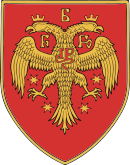Đurađ Crnojević
Đurađ Crnojević | |
|---|---|
| Lord of Zeta | |
| Coat of arms |  |
| Reign | 1490–1496 |
| Predecessor | Ivan I Crnojević |
| Succeeded by his brother | Stefan II Crnojević |
| Died | 1514 |
| Noble family | Crnojević noble family |
| Spouse(s) | Yela Thopia Elisabetta Erizzo |
| Father | Ivan Crnojević |
| Mother | Goisava Arianiti |
Đurađ Crnojević (Serbian Cyrillic: Ђурађ Црноjeвић, Church Slavonic: Гюргь Цьрноевыкь; d. 1514) was the last Serbian medieval Lord of Zeta[1] between 1490 and 1496, from the Crnojević dynasty. The son of Ivan Crnojević and the Albanian noblewoman Goisava Arianiti, he was the founder of the first Serbian printing house.[2] Crnojević styled himself "Duke of Zeta". He was well known by his great education, knowledge of astronomy, geometry and other sciences.
During his short-term reign he became famous for making efforts to spread the cultural heritage rather than for his political successes. The Ottomans made him leave Zeta in 1496. His brother Stefan inherited his position of the Lord of Zeta. In 1497 Venetians imprisoned Đurađ for some time, accusing him to be an Ottoman collaborator.[3] He again spent some time in Venetian prison in period between 30 July and 25 October 1498. This time the Ottomans insisted that Venetians should put him into prison, which they eventually did.[4] On 22 October 1499 he wrote his testament, which is considered as valuable literature work of its time.[5]
In the spring of 1500 Đurađ Crnojević came to Scutari, based on the invitation of Feriz Beg who instructed Crnojević to travel to Istanbul. In Istanbul Crnojević officially ceded his possessions to the sultan who granted him an estate (timar) in Anatolia[6] [7] to govern it as its sipahi.[8]
Although he was removed from the historical scene, his books remained as a great contribution to the Serbian culture. With the help of Hieromonk Makarije he printed five books of importance to the Serbian cultural heritage: Oktoih prvoglasnik (1493/94), Oktoih petoglasnik (1494), Psaltir s posljedovanjem (1495), Trebnik (prayer book; 1495/96), and Četvorojevanđelje (probably 1496).
Family tree
[edit]| Ancestry of Đurađ Crnojević |
|---|
His grandmother from his father's side was a sister of Skanderbeg. This made Đurađ Skanderbeg's grandnephew and through his mother he was the grandson of Gjergj Arianiti and nephew of Scanderbeg's wife Donika Kastrioti .
References
[edit]- ^ Slijepčević 1974, p. 43: "Према Карлу Хопфу и Балшићи и Црнојевићи »припадају без спора српскоме племену».
- ^ Fine, John Van Antwerp (1994). The Late Medieval Balkans: A Critical Survey from the Late Twelfth Century to the Ottoman Conquest. University of Michigan Press. p. 603. ISBN 978-0-472-08260-5. Retrieved 19 January 2012.
- ^ Veselinović & Ljušić 2008, p. 129.
- ^ Plamenac & Bojović 1997, p. 503.
- ^ Likovna 1990, p. 353.
- ^ Plavšić 1959, p. 52.
- ^ Emecen 2021, p. 1.
- ^ Martinović 1983, p. 12.
Sources
[edit]- Veselinović, Andrija; Ljušić, Radoš (2008). Srpske dinastije. Službene glasink. ISBN 978-86-7549-921-3.
- Plamenac, Rade Turov; Bojović, Jovan R. (1997). Memoari. CID. ISBN 9788649500471.
- Likovna (1990). Зборник Матице српске за ликовне уметности. Матица.
- Martinović, Dušan J. (1983). Portreti: bio-bibliografski pregled. Centralna narodna biblioteka SR Crne Gore "Đurđe Crnojević". ISBN 9788670790209.
- Plavšić, Lazar (1959). Srpske štamparije: od kraja XV do sredine XIX veka. Udruženje grafičkih preduzeća Jugoslavije.
- Emecen, Feridun M. (2021). The Teftiş Register (1497) of Đurađ Crnojević, Bey/Lord of Montenegro. THE JOURNAL OF OTTOMAN STUDIES.
